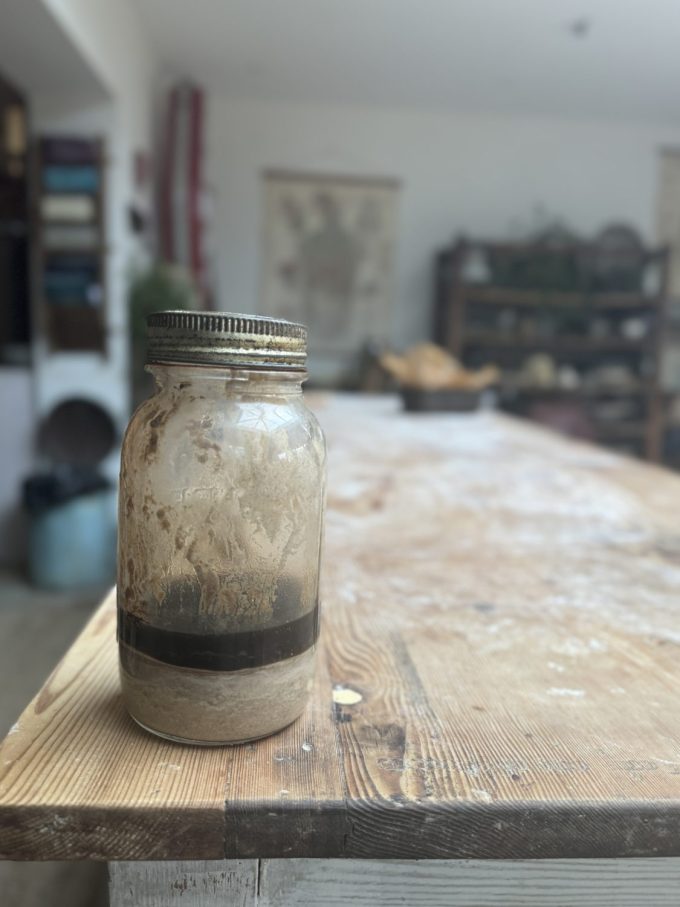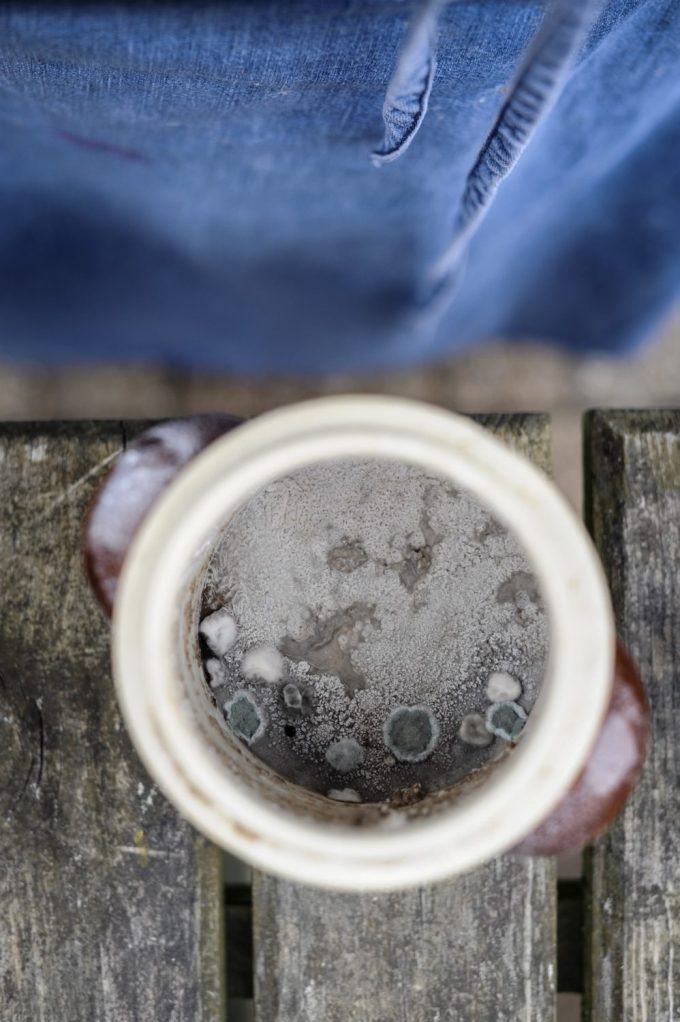We’ve compiled the most frequent questions we are asked about what happens if your sourdough starter goes wrong.

What is hooch, and how do I solve it?
Hooch is the grey or dark liquid that forms on the surface of a sourdough starter when it hasn’t been fed for some time. It is a byproduct of the yeast consuming all available nutrients in the flour and producing alcohol. Hooch is not harmful, but it is a sign that your starter is hungry and needs refreshing.
To solve it, pour off the hooch and refresh your starter as follows:
- Discard 2/3 of the starter to reduce acidity and make room for fresh feeding.
- Feed the remaining starter with equal parts flour and water @28C (I use 100g of flour and water).
- Stir vigorously to incorporate air, cover loosely, and leave in a warm place. 23C
- If your starter is particularly neglected, you may need to refresh it twice daily over a few days to bring it back to full strength.
With consistent feeding, your starter will regain its balance and become active and bubbly again.
Mature starters… but it smells of apples and it is so good
Often people thin that their sourdough starter has gone wrong when it gets a fruity smell. When yeasts are aerobic, they are at their most active. However, anaerobic fermentation (in the absence of oxygen) produces alcohol, which can result in a thin layer of water and alcohol (called hooch) on the starter’s surface. While the fruity smell of mature starters (apples, pears, or pineapple) can be delightful, it signals an overly acidic state. Refresh the starter immediately to restore balance.
Mature starter smells of nail polish remover OR old cheese
If your starter smells of nail polish remover (acetone) or old cheese (butyric acid), it’s too mature to use. These smells indicate a desperate need for refreshment. Refresh back-to-back at least three times before using it in baking to restore its strength and balance.

Can I change the flour I use?
Yes, you can change the flour you use, but continuity will help build a robust microbial community. Regularly feeding your starter the same flour keeps it stable. Switching flours is fine, but it may take a few refreshments for the starter to adapt to the new flour.
What kind of flour should I use?
I recommend using organic, freshly milled, and stoneground flour for the best nutritional support and microbial diversity. Options include white, rye, spelt, wholemeal, heritage grains, chocolate (with cocoa powder), and beetroot (using pureed beetroot instead of water).
How long can you leave a starter before it goes wrong?
I’ve revived starters left for over six months, though they can become very smelly, developing butyric acid that smells like parmesan or old trainers. Refreshing the starter multiple times can often revive it, though sometimes starting fresh is easier.
What if my starter has a layer of grey water on top of it?
This layer, called hooch, is a protective barrier indicating the starter has been left too long without feeding.
See above.
Help – I want to go on holiday. Does my starter need a babysitter?
No babysitter is necessary. Refresh your starter twice a day for two days before you leave. Revive it with regular feedings when you return.
Should I start my own starter or get one from another baker?
If you’re new to sourdough, getting an established starter from another baker is simpler and more reliable. It’s active, resilient, and ready to bake with, guaranteeing better results for beginners.
My starter smells horrid and has mould
A starter should never smell horrid, have black bits, or mould. If it does, discard it and start fresh. Bad smells usually occur due to infrequent refreshing. Refresh daily when starting a new culture and at least once a week for maintenance.
How and why do I convert a starter to white?
Wholegrain or rye is best for starting a culture because they’re nutrient-rich. To convert an established starter to white flour, simply refresh with white flour. White flour takes longer to peak, giving more scheduling flexibility for baking.
Will it float?
Floating is not a definitive test for readiness. White flour starters may float, but rye and wholegrain rarely do. Trust the visual and activity signs of your starter instead.
How do I make my own sourdough starter?
Combine 150g of organic stoneground wholemeal flour and 150g of water at 34°C in a jar. Whisk to incorporate air, cover loosely, and leave in a warm place for 12–24 hours. Repeat daily by discarding half and feeding with 75g each of flour and water at 28°C. Activity should appear within 3–14 days, depending on the flour and environment.
What if my starter has mould on it?
If mould appears, discard the top layer and refresh the uncontaminated portion with rye flour at 28°C. If black or red mould is present, discard the starter entirely and start over.
All reasonable care is taken when writing about health aspects of bread, but this information is not intended as a substitute for professional medical advice. Consult a qualified practitioner for health concerns.




 Mobilising an army of bakers – The Sourdough Exchange – UPDATED
Mobilising an army of bakers – The Sourdough Exchange – UPDATED
Leave a Reply